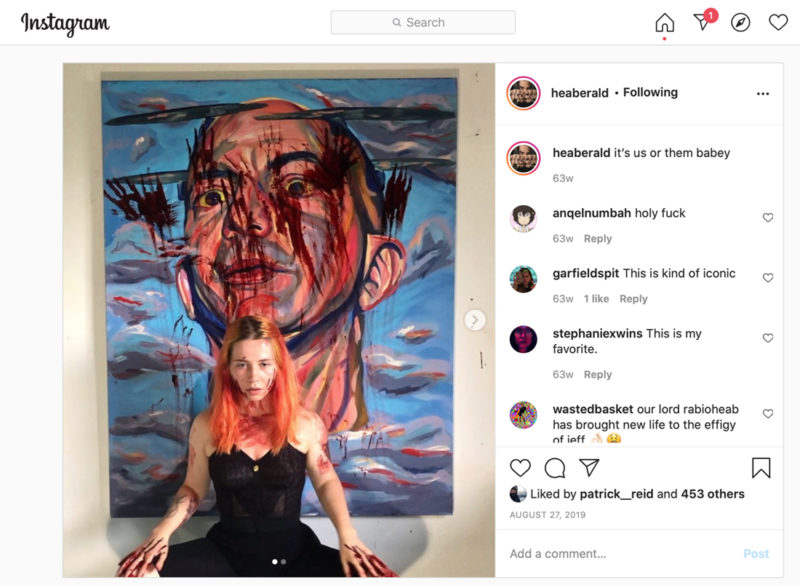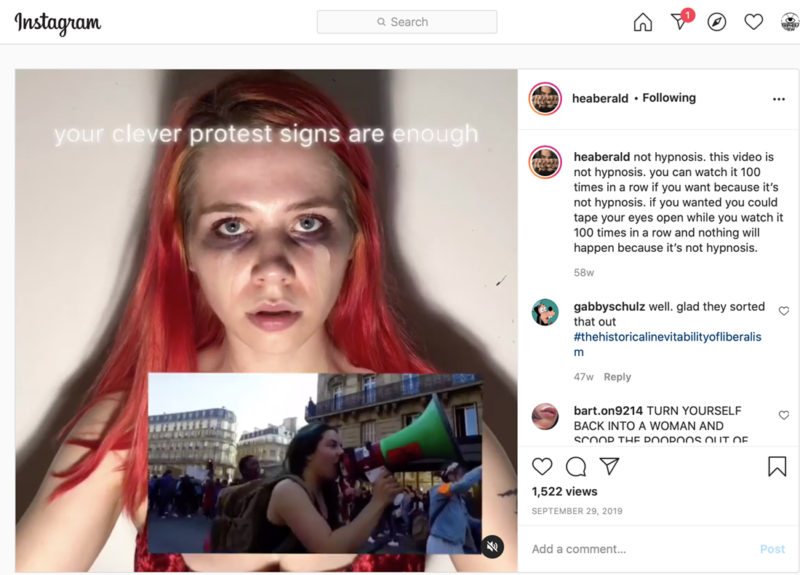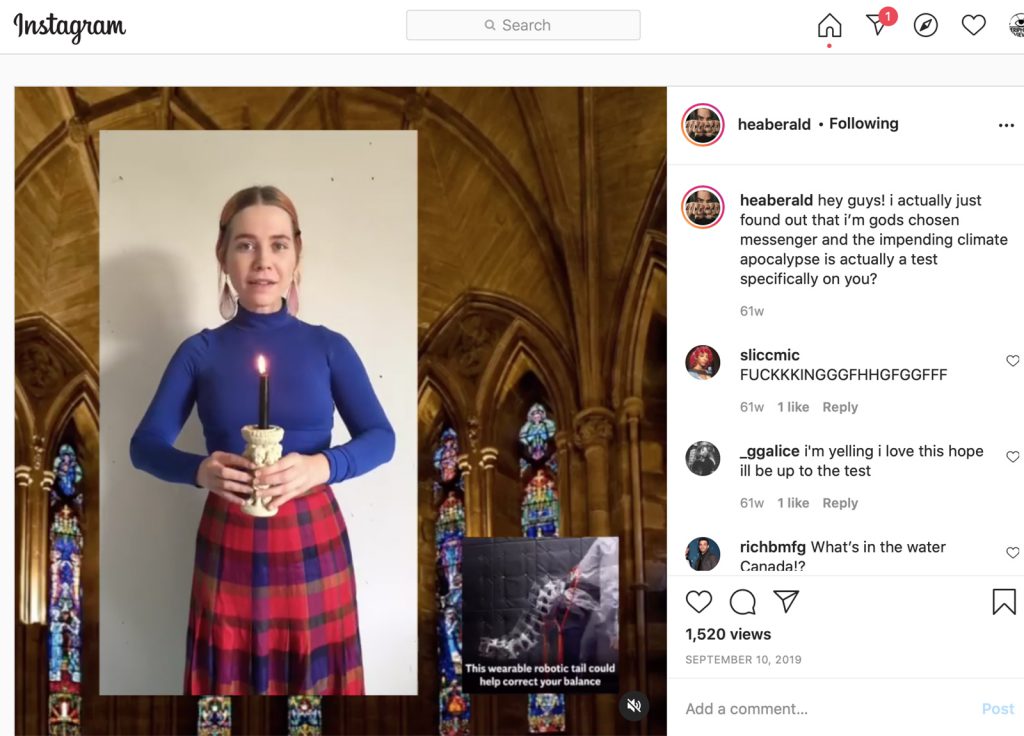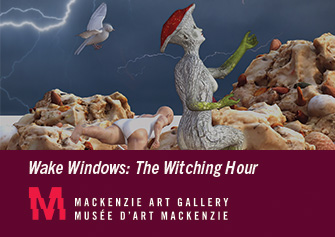Influencer Identity and Apocalyptic Prophecy: Summer Emerald via @heaberald
14 November 2020By Dallas Fellini

On her Instagram account, Summer Emerald asserts that she is the “World’s Hottest Doomsday Preacher.” Her Internet presence alone possesses the sort of authority that makes me unwilling to question this. For almost a year, I have been vigilantly watching the Montreal-based artist prophesize the apocalypse to her Instagram followers. Appropriately, my visits to Emerald’s Instagram page became more frequent after being placed under government-mandated social isolation in my gloomy basement apartment at the onset of the COVID-19 pandemic.
Emerald’s artistic practice spans acrylic painting and video performance art, both of which primarily manifest on her Instagram account @heaberald, where she explores tropes of celebrity, social media influencers, Internet pop culture, cults, and class critique. Over the months that I’ve kept up with Emerald online, her artistic ventures have jumped from obsessively painting disturbing portraits of Jeff Bezos, to falsifying a Drāno sponsorship, to preaching about the end of times. Most recently, I’ve become enamored by Emerald’s works where she acts out and parodies many of the seemingly apocalyptic symptoms we are beginning to experience. These explorations hold a particular pertinence to the dire realities brought on by COVID-19, and prompt us to consider our current circumstances during the pandemic not as something exceptional and fleeting, but as an accurate glimpse into a future environmental apocalypse, one that will certainly be coloured by the omnipresence of social media and the pervasive need for marketability.

In a series of posts on her Instagram page, Emerald falsifies a campaign urging her followers to eat human meat. In one video, looking into the camera, Emerald addresses her viewer with a quintessential influencer smile and greeting: “Hey guys, there’s nothing wrong with eating human meat…eating human meat leaves even less of a carbon footprint than being vegan…it’s packed with vitamins and minerals.” The video is collaged against a screenshot of an article theorizing that the climate crisis will bring about the need to eat human flesh, as well as clips from a famously uncomfortable video of multi-billionaire Mark Zuckerberg repeating the phrase “smoking meats.” Adding yet another layer of inexplicable chaos to the video, is the cheery instrumental music that serves as the audio background to the piece. Brain-numbing, free-use music like this accompanies countless YouTube vlogs and Instagram cooking videos filmed from the “Buzzfeed Tasty” angle. Including free-use music in her videos centres capitalization (1) and suggests that Emerald fears having her human meat product placement demonetized. Emerald puts forward the idea that even if and when food scarcity reaches a severity that forces humans to cannibalism, there will still be a way for this to be marketed as fun-and-sexy through lifestyle-vlogger-capitalism. I’m reminded of the hundreds of memes, videos, and even advertisements that satirized the hoarding-induced toilet paper shortages that were taking place in March of this year. I’m also reminded of how shortages of food and household essentials like this have been exploited in recent months—either through price gouging or through online content that endeavors to make a profit off of the next big trend.

Another video on Emerald’s page features the artist staring intensely out at her viewer—so motionless that it initially reads as a photograph—overlaid with a famed video of Billie Eilish and Woody Harrelson making a call for action against climate change. Emerald has deep circles under her eyes and concealer eerily smeared down her face. Overtop her image, text appears in a news-flash-esque effect: “violence isn’t the answer—the ruling class are your friends—they would never do anything to hurt you—continue to march peacefully—don’t blow up a pipeline—don’t behead a fortune 500 CEO”. Emerald satirizes celebrity activism, reinforcing the idea that before the oncoming environmental crisis can be considered an ecological issue, it must also be considered a class issue. By addressing the imminent need for revolutionary class action and violent retaliation against those in power, while somehow still making it feel light-hearted, Emerald challenges her followers to critically engage and take action themselves. In much of Emerald’s work, she encourages her viewer to imagine their life under a full-blown future environmental apocalypse. In many ways, COVID-19 has highlighted early indicators of the apocalypse that Emerald encourages us to imagine: increased and militarized policing of citizens, closed borders, and scarcity of food and medical supplies are all currently contributing to amplified class divides and laying bare the failings of capitalism. Not only does Emerald identify these symptoms, but she also cleverly proposes the type of concrete resistance that will be necessary to avoid the realization of her prophecy.
Emerald gives us a closer and more personal understanding of this prophecy through an ominous video in which she stands holding a lit candle stick and grinning out at her viewer. In a haunting and perfectly-honed influencer voice Emerald says, “Hey guys, I actually just found out that I’m God’s chosen messenger and the impending climate apocalypse is actually a test, specifically on you.” Again, Emerald appropriates the stereotypical “Hey guys” greeting—a mantra of YouTube personalities and vloggers both aspiring and celebrated—suggesting similarities between cult followings and influencer followings. This video, shared in September of 2019 (long before even the first confirmed case of COVID-19), employs social media influencer techniques to address a global crisis in a way that feels comically absurd. Months later, I’ve found myself clicking on YouTube videos titled something along the lines of “WHAT I EAT IN A DAY: QUARANTINE EDITION” and watching white celebrities dilute the Black Lives Matter movement by reducing it to a caption for their selfies. I can’t help but feel as though I’ve become trapped in the actualization of Summer Emerald’s prophecy, wherein influencers across platforms jump at the opportunity to capitalize on the novelty of a global crisis in order to remain relevant.
Like many emerging artists today, Emerald doesn’t have a website and instead relies on Instagram to catalogue her work. In recent months amidst gallery closures, I’ve watched Instagram consistently prove its ability to shapeshift as it stands in for galleries, sites, and individuals. The malleability of Instagram is something Emerald uses to her advantage, her online persona mimicking those of influencers (2) who upload relatable expressions of their personalities in order to be marketable. In a sense, I feel that the most honest exhibition of Emerald’s work will always be via @heaberald, and that when her work is taken out of its Instagram-based context it loses some of its pertinence. Right now, it feels as though this pertinence reached a crescendo that perfectly coincided with (what might have been) the height of the COVID-19 crisis in Canada. In her appropriation of the tools of digital influencer identity-crafting, and her indulgence in the Christian preoccupation with the world ending, Emerald creates a parodic and absurd apocalyptic universe condensed to exist within the frame of a single Instagram account. Emerald’s work underlines our collective reliance on platforms like Instagram during this time of crisis, while pointing to the absurdity of this dependency, and how this relationship may continue to morph, veering towards the sinister.
1. Influencers, particularly YouTube creators, rely on this type of royalty-free music in order to avoid getting copyright striked. This ensures that they are able to turn their internet engagement into wealth, monetizing the position of “influencer” and allowing it to fit comfortably into our current reality of global capitalism.
2. Caroline Calloway, Trisha Paytas, and Teala Dunn are a few influencers who have mastered this skill.
Summer Emerald’s work can be found on her Instagram page @heaberald.
Feature Image: Screenshot from Summer Emerald’s Instagram page @heaberald. Photo used with permission of the artist.



